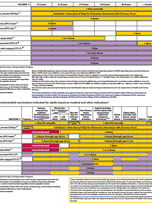Frequently Asked Questions About Harassment & Vaccine Schedules
.jpg.aspx?width=152&height=205)
NVIC receives many questions about vaccinating according to the federally recommended childhood schedule and below are answers to the questions we receive. Please note that NVIC does not make vaccine use recommendations and does not give medical or legal advice. The information NVIC provides is for educational purposes only and a starting point to becoming informed.
If you have experienced vaccine bullying or harassment or have been kicked out of a medical practice, NVIC encourages you to file a harassment report. You can also read harassment stories posted by the public on NVIC's Cry for Vaccine Freedom Wall, as well as download helpful information from our Ask 8 Vaccine Information Kiosk. If you are looking for a new health care provider, there are organizations that may be able to help you identify a provider. To learn more about vaccines and diseases, and their associated risks, please visit our referenced vaccine and disease web pages.
A: NVIC is often contacted by parents who, for various reasons, want to delay or decline one or more vaccines recommended by the Centers for Disease Control and Prevention (CDC) and the American Academy of Pediatrics (AAP). Many parents making informed, independent vaccination decisions are told by their health care providers to find a new provider. Others are asked to sign a “refusal to vaccinate” form.

Health care providers differ on whether or not it is appropriate to kick families out of a medical practice due to vaccine refusal. Some providers feel that it is better to retain families who have vaccine questions. Other providers have a "zero-tolerance" policy for non-compliance.
Not all health care providers believe that strict adherence to the CDC recommended vaccination schedule is in the child's best interest. Even so, it can be very difficult for families choosing alternative vaccination schedules or who make the decision not to vaccinate to find health care providers who are willing to be flexible and work with parents. This is due, in part, to strong peer pressure for health care providers to conform to the policy promoted by medical organizations, such as the AAP, American Medical Association (AMA), and government health officials.
Notably, many vaccine refusal forms contain language that many parents disagree with or that compel parents to agree to statements that imply the parent is not a good parent for delaying or declining vaccines. It is important to understand that when vaccine refusal forms are signed, they become a part of the permanent medical record, though, at this time, they are not required by law. If you are told you are legally required to sign a refusal form, consider seeking legal advice.
While kicking a family out of a medical practice solely based on vaccination status may be legal, it raises serious ethical concerns that contribute to fear and distrust of health care providers. Parents faced with these situations may need to find a new pediatrician, family practice physician or other qualified health professional who respects their informed consent right to make voluntary vaccination decisions without coercion and sanction.
NVIC encourages parents who have been kicked out of a medical practice or who experience other types of vaccine harassment to file a harassment report. You can also read harassment stories posted by the public on NVIC's Cry for Vaccine Freedom Wall, as well as download helpful information from our Ask 8 Vaccine Information Kiosk. If you are looking for a new health care provider, there are organizations that may be able to help you identify a provider. To learn more about vaccines and diseases, and their associated risks, please visit our vaccine and disease web pages.

A: NVIC does not make vaccine use recommendations and does not give medical or legal advice, nor does NVIC monitor or comment on the safety or efficacy of particular vaccination schedules.
However, NVIC is aware that many parents and individuals have concerns about the administration of multiple vaccines given on a single day. Many want to continue to vaccinate can become informed and choose an alternative schedule. Some parents and individuals decide which vaccines they want for themselves and their children and also decide on the timing of when to receive these vaccines. Others decide to give only one vaccine at a time and lengthen the time between giving vaccines, which may differ from the federallly recommended schedule for children and adults. There are also other individuals and parents that decide to get themselves and/or their children tested for antibody titers to see if they need additional vaccines to achieve antibody levels that are considered to be indicative of "being immune."
NVIC supports your vaccine informed consent right to have access to accurate information and to make voluntary decisions for yourself and your children without coercion and/or sanction. The information provided by NVIC is for educational purposes only and is a starting point to becoming informed.

A: If you are asking these questions, you are on the right track. NVIC encourages all health care consumers to do their own research and engage in fully informed decision-making whenever considering a medical intervention or use of pharmaceutical products, including vaccines.
There is a large amount of information on NVIC's website including a list of resources containing websites, books, videos and referenced information on infectious diseases and vaccines. It is important to review information from many different perspectives, including visiting government-operated websites like the Centers for Disease Control and vaccine-promoting organizations and pharmaceutical company websites like the Immunization Action Coalition to fully understand all views about vaccine safety and effectiveness.
The key is to learn about the benefits and complications of both infectious diseases and vaccines and, after consultation with one or more trusted health care professionals and in consideration of vaccine contraindications and your child's personal and family medical histories, decide which course of action is most appropriate for yourself and your children.

A: There are some vaccines which should not be given together and there are recommended minimum time periods for intervals between vaccinations. For each of the vaccines, you can consult the CDC's recommended schedules and the manufacturer product inserts to learn about official recommendations for time periods between vaccinations.
Some people choose to wait for two to four months or more between vaccinations. Using all available information and/or working with a trusted health care professional, you may want to develop a tailored vaccination schedule that you are comfortable using. To learn more about vaccines and diseases and their associated risks you can also visit NVIC's referenced vaccine and disease web pages.

A: Because the TB test isn't a vaccine, per se, this concern is something that NVIC does not routinely address. We are aware, however, that some employers and educational institutions will accept negative chest x-ray tests as evidence of TB status. Additionally, some states such as New Jersey have exemption forms specifically for TB testing concerns.
Explore FREE downloadable educational materials



